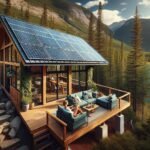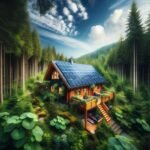Starting an off-grid solar cabin project in Canada might seem like a dream come true, but timing is everything. With the country’s harsh winters and unpredictable weather, choosing the wrong season can lead to costly setbacks and inefficiencies. Did you know that snow accumulation can reduce solar panel efficiency by up to 25% during winter months?
When you consider the challenges posed by Canada’s cold climate, you might ask yourself: is there truly a perfect time to begin this ambitious try? Understanding the worst times to kick off your project can save you from frustration and wasted resources. Dive deeper into the seasonal pitfalls that could derail your off-grid aspirations and discover how to navigate them effectively.
The Worst Times to Start Your Off-Grid Solar Cabin Project in Canada
You might think spring or summer is the perfect time to kick off your off-grid solar cabin project, but hold on. The reality is, these seasons, while sunny, might not be the best choice for initiating such an ambitious venture. Why? Let’s break it down.
Starting your project in the late fall can be a recipe for disaster. As temperatures start to drop, you may face unexpected snow accumulation that severely impacts the installation of solar panels. Imagine struggling with frozen ground or snow-covered rooftops just when you were hoping to set up your solar energy solution. Not the ideal scenario, right?
 Why off-grid solar cabins are the new glamping in Canada
Why off-grid solar cabins are the new glamping in CanadaWinter is another challenging time. Canada’s winters are notoriously harsh, and solar production is at its lowest during these months. Even if you’re dreaming of a cozy solar lifestyle from the get-go, the setup might not deliver the efficiency you need. Not to mention, the installation process can get tricky when ice and snow make access a nightmare. It’s tough to envision efficiently using solar panels when they’re buried under snow, isn’t it?
Then there’s the unpredictable weather of early spring. One moment it’s sunny; the next you’re knee-deep in mud with last winter’s remnants. Starting your project when the ground is wet can compromise both installation and long-term stability, leading to costly repairs down the road.
By timing your project correctly, you can ensure that the solar panels you choose will deliver the energy you need, maximizing your investment in solar technology. Explore our resources on when to begin on your solar adventure, and equip yourself for success with the right information and tools.
Seasonal Considerations
When planning your off-grid solar cabin project in Canada, you can’t overlook how the seasons can impact your investment in solar panels. Timing is everything, right? Let’s dive deeper into the seasonal challenges you might face.
Read also: Why off-grid solar cabins are the new glamping in Canada
Why off-grid solar cabins are the new glamping in Canada Don’t fall for these common myths about off-grid solar cabins
Don’t fall for these common myths about off-grid solar cabinsWinter Challenges
Winter in Canada is undeniably beautiful, but it comes with significant hurdles for solar energy enthusiasts. Heavy snow accumulation can diminish your solar panels’ efficiency, leaving you with less energy than anticipated. Imagine trying to keep your cabin cozy when your power production drops due to a layer of snow on your panels. Plus, installing during this season is no picnic. Ice can make setup treacherous and lengthy. Wouldn’t it be smarter to put your plans on hold until conditions improve?
Spring Uncertainties
Spring might scream “go time” for many projects, but it offers its own unpredictable challenges. The weather can be capricious, giving you sunny days one moment and snowstorms the next. As temperatures rise, melting snow can lead to muddy conditions that hinder installation. You want your panels secured and stable, not struggling in muck. So ask yourself—why risk your home’s energy future when you can wait for more favorable weather?
Summer Heat
Ah, summer! It feels like the perfect season to launch your solar lifestyle. But don’t be too quick to assume all systems are go. Extreme heat can also impact your solar panels’ performance. Did you know excessive heat can lead to panel overheating, which in turn causes efficiency losses? Keeping that in mind, it’s vital to consider how well you can maintain the setup during torrid days. Choosing to start your project too late in the summer might leave you scrambling as autumn approaches.
Fall Preparations
Fall surely has its charm with cooler temperatures and vibrant colors, but the onset of winter looms near. While it may feel like the ideal time to start a solar project, you’ll want to pay attention to dropping temperatures and the potential for early snow. Rushing to complete your installation before winter can lead to cutting corners, which is never a good idea with solar panels. What if you could invest a little extra time to plan properly? Emphasizing preparation now will pay dividends when winter arrives.
Read also: Why off-grid solar cabins are the new glamping in Canada
Why off-grid solar cabins are the new glamping in Canada Don’t fall for these common myths about off-grid solar cabins
Don’t fall for these common myths about off-grid solar cabins Amazing things nobody tells you about off-grid living in Canada
Amazing things nobody tells you about off-grid living in CanadaAs you weigh your options, considering these seasonal challenges could make all the difference in achieving an efficient off-grid solar lifestyle. Explore our resources at Solar Panels for Life to equip yourself with the knowledge you need for a successful project.
Financial Implications
Starting your off-grid solar cabin project at the wrong time can have significant financial repercussions. Understanding these implications can make or break your solar lifestyle.
Budgeting for Seasonal Changes
When considering budget allocations, it’s vital to factor in seasonal shifts. Think about it: if you begin your project just before winter, the likelihood of weather-related delays can skyrocket. Unforeseen snow accumulation can delay installation and result in increased labor costs. Imagine pouring your hard-earned money into a project only to deal with unanticipated expenses. Planning for the costs associated with winter weather, like heating and maintenance for your equipment, means you’re prepared to handle those slippery surprises. To truly maximize your investment in solar panels, consider building a buffer into your budget for these seasonal changes and potential delays.
Price Fluctuations in Materials
Material costs can fluctuate throughout the year, influenced by demand and supply chains. Purchasing solar panels in the off-season might save you quite a bit, but if your timing leads to unexpected shortages—like what can happen during peak installation seasons—you might end up facing higher prices. Picture this scenario: you score a fantastic deal on solar panels in spring, only to realize you need to wait until fall to install them. The market could change by then. Keeping an eye on industry trends, like shifts in solar technology or pricing from top manufacturers, can help you strategize the best time to buy. Why risk overspending when you can confidently plan your project around market dynamics? For those exploring the solar energy world, adopting a proactive mindset will save you money and stress down the line.
Read also: Why off-grid solar cabins are the new glamping in Canada
Why off-grid solar cabins are the new glamping in Canada Don’t fall for these common myths about off-grid solar cabins
Don’t fall for these common myths about off-grid solar cabins Amazing things nobody tells you about off-grid living in Canada
Amazing things nobody tells you about off-grid living in Canada The ultimate packing list for your off-grid Canadian adventure
The ultimate packing list for your off-grid Canadian adventureTechnical Difficulties
Jumping into your off-grid solar cabin project at the wrong time can lead to a series of technical headaches. It’s crucial to understand how equipment availability and installation issues can impact your solar lifestyle.
Equipment Availability
One of the first roadblocks you might face is equipment availability. Have you ever waited for the perfect tool only to find it sold out? The same principle applies to solar panels. When you plan your project during peak seasons, your desired solar panels might be in short supply. Imagine targeting late fall for installation; you could encounter delays in receiving essential components. Some suppliers may have fluctuating stock levels or long lead times, meaning you could miss your window to harness the sun’s energy effectively. Planning ahead and securing equipment during the off-season not only ensures you have what you need but can also save you money.
Installation Issues
Installation can often be a challenging job, especially in less-than-ideal weather. Think about the last time you tried to assemble furniture on a rainy day—frustrating, right? Now imagine that, but with solar panels. In winter, heavy snow and ice can create treacherous conditions for both you and your installer, leading to accidents and increased labor costs. Similarly, early spring’s unpredictable weather can turn a simple installation into a muddy mess. This is why timing is everything. Planning for clear, stable weather can streamline your process and ensure you set up your solar panels for life in the best possible conditions.
Exploring these technical challenges effectively can not only save you time but also boost your system’s overall efficiency. If you’re ready to learn more, exploring the latest solar panels could be your next step in this exciting journey.
Weather Patterns
Choosing the right time to kick off your off-grid solar cabin project in Canada is critical, especially when it comes to understanding local weather patterns. The interplay of seasons can greatly impact both your installation timeline and the efficiency of your solar panels.
Snow Accumulation
Winter in Canada is no joke, and heavy snow accumulation can wreak havoc on solar energy systems. It’s not just about the beauty of a snowy world; snow can block sunlight from reaching your solar panels and significantly reduce their efficiency. Did you know that a thick layer of snow can cut energy production in half or more? If you’re planning to install solar panels this season, think again. Trying to set everything up amidst snowy conditions can complicate the installation process, making it prone to delays. Instead, aim for an earlier installation in fall to avoid this winter challenge and ensure your solar lifestyle takes off smoothly.
Rainy Seasons
Let’s talk about those rainy seasons. Spring in Canada may seem appealing for project initiation, but it comes with its own set of challenges. The unpredictable downpours can transform your installation site into a muddy mess. Imagine trying to lay down solar panels while slipping and sliding through the mud—definitely not ideal! Plus, the wet conditions can delay your timeline and lead to longer drying times for building materials. The last thing you want is to push back your solar project just because of the weather. Planning ahead can save you from these headaches, so consider scheduling your work during drier months and learn about the best practices for managing installation during those trickier times.
Local Regulations and Permits
Exploring local regulations and permits is a critical aspect of launching your off-grid solar cabin project. This process can be intricate and is often influenced by the season when you decide to start.
Seasonal Permit Delays
Did you know that the time of year can impact how quickly you receive necessary permits? Many municipalities experience seasonal backlogs, particularly during spring and summer when everyone else is vying for approvals. As homeowners rush to set up solar panels for their summer retreats, your application may end up at the back of the line. That’s not just frustrating; it can lead to delays that complicate your overall timeline. Imagine waiting weeks for an essential permit while the optimal weather slips away. Aligning your project start date with a quieter permit application period could save you from these hassles. Wouldn’t it be better to kick off your solar lifestyle journey without those nagging delays?
Zoning Considerations
Zoning regulations can also play a significant role in your project. These rules dictate what you can and cannot do with your property. For example, some areas may require specific setbacks or limit the height of your solar panels. You don’t want to find out halfway through the installation that your carefully chosen site doesn’t meet local guidelines, right? Taking the time to understand these regulations before you start your project is essential. It may involve a bit of research on your end, but think of it as laying a solid foundation for your solar dream. Knowing the zoning requirements well in advance keeps your project on track and permits secure.
Alternatives to Consider
When it comes to starting your off-grid solar cabin project in Canada, timing is everything. But, if you’re facing the harsh realities of seasonal limitations, there are still alternatives you can explore.
Optimal Times for Project Start
Think about spring and late summer as prime windows. During these periods, temperatures rise, giving you a better shot at efficient solar panel installation and energy production. Spring encourages optimal weather for setting up your solar panels as the ground starts to thaw and the sun shines more consistently. Late summer can be a great time too. The days are long, and you can maximize solar energy collection before the cold months set in. Have you ever noticed how daylight changes? These longer summer days provide the perfect backdrop for nailing down any final project details.
Off-Season Strategies
If you find yourself limited by seasonality, consider making the best of the off-season. For instance, winter, while daunting, can still present opportunities. Think about investing in solar panels during this time. Prices may drop in colder months due to decreased demand, making it an ideal time to purchase your materials. You could focus on planning and securing permits when weather holds you back from physical work. Research reveals that some homeowners manage to navigate permits faster in winter, as fewer applications come in. Also, you could consider temporary installations or portable solar generators to keep your energy needs met while you prepare for the main project. Curious how a temporary setup could integrate into your workflow? It’s about staying connected to your solar lifestyle while waiting for more favorable conditions.
Conclusion
Timing is everything when it comes to your off-grid solar cabin project in Canada. By avoiding the pitfalls of harsh winters and unpredictable weather, you can save yourself from frustration and financial strain.
Planning your project during the right seasons not only maximizes solar efficiency but also ensures a smoother installation process. Remember to consider local regulations and permit timelines as they can impact your project’s progress.
With careful planning and an understanding of seasonal challenges, you can set yourself up for success. Embrace the journey and make informed decisions to enjoy the benefits of your solar cabin for years to come.
